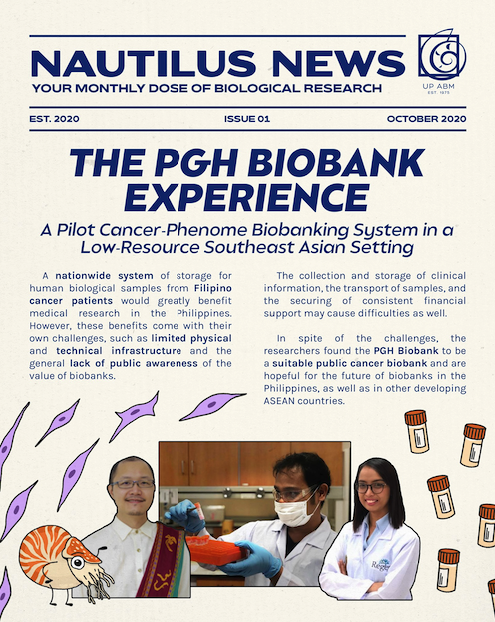
WHAT
A biobank is a biorepository that logs, processes, stores, and then distributes biological specimens and samples for further in vitro research or for clinical care [1]. This study evaluated the PGH Biobank experience and assessed the various logistical aspects of establishing and maintaining a biobank. It was found that there is a general lack of equipment and dedicated biobank infrastructure in the Philippines; equipment that is difficult to procure and more often than not, double the price due to the need for a middleman. Moreover, data collection proved to be difficult as there is a lack of standard operating procedures for biobanks in the Philippines. Transport of fresh tissues was also found to be challenging due to long travel times caused by traffic and delayed flights. In the end, the study surmised that there is an overall lack of funding as the public is not well-informed on the advantages of biobanks to advancing clinical research.
WHY
Biobanking systems have progressed globally, but remain underrepresented in developing ASEAN countries. The establishment of a public biobank addresses the high cancer incidence and mortality in the Philippines and provides researchers access to biological samples from a wide array of patients. This includes low-income individuals, a demographic seldom seen in the small biobanks of private hospitals. The Philippine General Hospital (PGH) Biobank and the UPD Institute of Biology (IB) Cell Repository experience demonstrate the feasibility of establishing government-supported cancer biobanks in developing countries. Biospecimen collection from a broader demographic of Filipino patients would provide higher quality data for cancer-related research, biomonitoring studies on the genetic identity and possible risk factors of Filipinos, and the acceleration of medical innovations. The importance of biobank networking has been exemplified by developed institutions around the world, the PGH Biobank allows Filipino researchers to collaborate with other countries in biomonitoring studies, such as those concerning cancer-related health disparities in the ASEAN population.
HOW
The implementation of the PGH biobank included patient recruitment, data collection, sample acquisition, and cell culture as facilitated by the UPD IB Cell Repository. The study assessed the challenges encountered in these aspects, taking into consideration the funding, infrastructure, and technology provided. The researchers presented an outline of the PGH Biobank system, including its workflow and organizational framework. A total of 75 breast, 25 endometrial, and 25 ovarian cancer patients, in addition to 25 healthy people, were subjected to specimen collection: all of Filipino descent. The samples collected comprised of urine, blood, and tissue. Urine and blood were processed and stored until their transferal to USCF for biomonitoring analysis. Tissue samples were immediately shipped to the Institute of Biology (at an ideal temperature of ~4°C), where cancer and cancer-associated cells were then isolated, cultured, and propagated in vitro.
What the Authors Say
“So when I heard about this project, I saw its great potential to support the research and development sector in the Philippines that I decided to come back to the Philippines and work on this project with Prof. Michael C. Velarde, PhD. A biobank is not just simply a collection of biospecimens, it has contributed to a number of translational researches, health innovations, and even policies in other countries. While biobank has progressed globally, the biobank in the Philippines remains to be underrepresented. Thus, I saw a dire need to pursue this field. As evidenced in developed countries, biobanks have accelerated drug, vaccine, and diagnostic tool discovery; biobanks can also be a research collaboration hub for scientists, medical doctors, and researchers to attain more relevant discoveries and innovations in the future.” – 𝐃𝐫. 𝐌𝐚. 𝐄𝐚𝐬𝐭𝐞𝐫 𝐉𝐨𝐲 𝐕. 𝐒𝐚𝐣𝐨
“I want my research to have an impact on society. But in order to push our basic research to be more applicable to the clinic, we have to get clinical samples. This is very difficult given that I do not see patients, as I am not a medical doctor. Vice versa, it is very difficult for clinicians to do research as they are focused on taking care of patients and they have limited time to do research. Hence, a biobank is critical to bridge the gap between basic and translational research by allowing access to human samples for research purposes. Our research explored the possibility of establishing a biobank at a public hospital (PGH) in the Philippines. I can always use cell lines obtained abroad to discover new compounds to target cancer, but these cells are not of Filipino origin and do not have the same genetic identity as our peoples’. Hence, having access to cells and tissues obtained from Filipinos will help us move closer to discovering medications relevant to Filipinos”. – 𝐃𝐫. 𝐌𝐢𝐜𝐡𝐚𝐞𝐥 𝐕𝐞𝐥𝐚𝐫𝐝𝐞
CREDITS
Caption and Summary by: Arianne Yaneza, Mauro Dualan, Mika Nabong, Teo Eugenio, Macky Villaneuva, and Sean Chua
Template by: Greg Besande
Nat the Nautilus by: Rachelle Ang
Pub by: Sky Diaz, Gillian Uy
REFERENCES
[1] Souza, Y. G., & Greenspan, J. S. (2013). Biobanking past, present and future. Aids, 27(3), 303-312. doi:10.1097/qad.0b013e32835c1244
[2] Sajo, M., Teves, J., Corachea, A., Diaz, L. A., Chan, A., Valparaiso, A. P., Dy Echo, A., Macalindong, S. S., Uy, G., Dofitas, R. B., Habana, M., Gerona, R. R., Irwin, J. C., Giudice, L. C., & Velarde, M. C. (2020). A Pilot Cancer-Phenome Biobanking System in a Low-Resource Southeast Asian Setting: The Philippine General Hospital Biobank Experience. Biopreservation and biobanking, 18(3), 180–188. https://doi.org/10.1089/bio.2019.0114
[3] Website. (n.d.). Retrieved from https://www.biobank.ph/
ORIGINAL POST
https://www.facebook.com/UPABMOfficial/photos/a.3995244250490014/3935781656436274/



